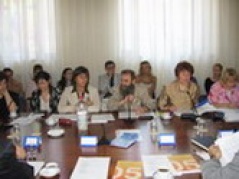National Assembly of the Republic of Serbia / Activities / Activity details

Thursday, 6 July 2006
Joint Sitting of the Committee on Labour, Ex-Servicemen’s and Social Issues and the Poverty Reduction Committee
The Committee on Labour, Ex-Servicemen’s and Social Issues and the Poverty Reduction Committee held a joint sitting on 5 July.
The Committee on Labour, Ex-Servicemen’s and Social Issues and the Poverty Reduction Committee held a joint sitting on 5 July. The sitting, devoted to discussing the position of refugees and internally displaced persons in
Welcoming the participants, National Assembly Chairman Predrag Markovic expressed his support for such projects and reiterated that introduction of standards needed to be balanced with region-specific issues. He emphasised that ‘[
Mr Markovic went on to add: ‘Integrating people who came to
Officials of the Office of the Commissioner for Refugees, the Ministry of Education and Sports, the Co-Ordination Centre for Kosovo and Metohia, the Vojvodina Executive Council, UNHCR, OSCE, the Humanitarian Centre for Integration and Tolerance, PRAXIS, an organisation providing free legal assistance to refugees and internally displaced persons, the Association of Serbs from Croatia, the Serbian Refugee Council, the Pravda Communication Centre, and the ‘Right Answer’ Serbian Democratic Forum.
The sitting heard that
The sitting raised a number of questions relating to the exercise of refugees’ and displaced persons’ rights, including difficult access to personal documents, employment, access to social services, absence of an asylum system, etc. Special attention was devoted to refugee and displaced persons’ integration and return programmes, citizenship programmes, and housing and income projects. Another pressing issue was the inability of some people, especially refugees from
Committees related to this activity
-
10.00 - visit of the students of Belgrade Trade School to the National Assembly House (National Assembly House, 13 Nikola Pasic Square)
-
11.00 - the Chairperson of the Foreign Affairs Committee meets with Chinese ambassador to Serbia (National Assembly Building, 14 Kralja Milana Street, hall 53, 2nd floor)
-
12.00 - visit of the students of the Vojvoda Radomir Putnik Elementary School to the National Assembly House (National Assembly House, 13 Nikola Pasic Square)

